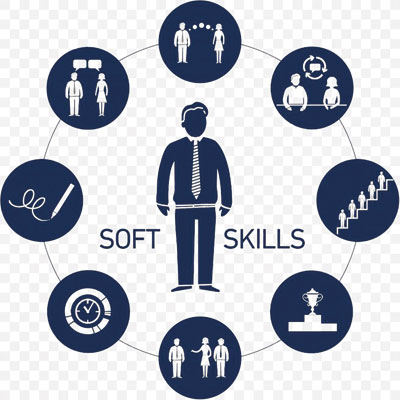Significance of soft skills for undergraduates
View(s):Introduction
Soft skills, which are also referred to as people skills, are a combination of interpersonal and social skills together with character traits, which illustrate an individual’s relationships with others. Thus, soft skills have more to do with who people are than what they know. Moreover, they incorporate the character traits that decide how well an individual interacts with another/others and usually are an integral part of an individual’s personality. Soft skills, also known as people skills are professional attitudes and character traits which are necessary skills required by employers.
What are soft skills?
Soft skills which are perceived to be difficult to classify can be defined as non-technical abilities that permit effective interaction with others in personal, social, and professional contexts. Though difficult to measure, soft skills play a pivotal role in an individual’s overall adaptability and competence.
Some examples of soft skills are time management, team work, creative thinking, communication skills, patience, problem solving, positivity and adaptability. Some such soft skills which need to be projected by undergraduates include effective communication, resilience, responsibility, empathy, stress management, problem-solving, engagement and teamwork.
These skills include qualities that aid employees in the effective interaction with others and enable them to be successful in the workplace. Soft skills can be ingrained in one’s personality or they could be traits acquired through life experiences. However, this article focuses on soft skills that undergraduates need to have in order to enable them to garner and project a good impression in their relevant field of interest.
What are hard skills?
Every position in an organisation requires hard skills, which are unique to the job and level of seniority. Employers look for these skills in the workplace as they are essential for the job. Some examples of hard skills include editing, content management, operating systems, network administration, and graphic design. Undergraduates can improve their professional advancement by improving on and strengthening both their soft and hard skills.
Why do undergraduates need soft skills?
It has been observed that employers as well as educators frequently complain about the lack of soft skills among graduates from tertiary education institutions.
Obtaining a degree is an imperative in the modern world which will undoubtedly improve one’s job prospects. However the job market requires graduates to possess skills in addition to the hard-skills gained through degrees, which will make them effective and efficient in the workplace. Hence, modern-day employers expect potential candidates seeking employment, to possess soft skills, in addition to a degree and technical know-how so as to be successful and thrive in the workplace. Being able to demonstrate soft skills will surely enhance one’s employability prospects and help one succeed in whatever task one is assigned to.
Academic domains in the 21st century infuse their courses with technology and soft skills so as to enable graduates to pursue their careers and climb the ladder of success in their workplace. The world of employment has advanced by leaps and bounds and has transformed into an incredibly competitive job market in its demand for well-rounded employees. Thereby, developing soft skills in undergraduates has been included in many syllabi. Moreover, soft skills can positively impact academic performance, where, for instance, students who have strong communication skills can actively participate in class discussions and express their ideas more effectively in written assignments. Thus it could be said that soft skills enable undergraduates to perform better in their education whilst equipping them to perform in their careers.
What are the important soft skills that undergraduates require?
Adaptability: This is an important soft skill that refers to an individual’s ability to adjust to evolving conditions or environments while staying current with the latest protocols. It involves meeting new customer requirements or adapting to new technological developments in a work setting. Moreover, it may involve pursuing a job which is not in one’s area of expertise or enhancing one’s career by taking on new responsibilities.
Communication: Communication skills are essential in comprehending, collaborating, and engaging in productive conversations. Body language, tone of voice, consistency and the ability to question are important to develop effective communication skills. Possessing strong communication skills is advantageous when facing interviews and throughout one’s career. The ability to communicate well involves knowing how one should speak to others in different situations or settings.
Teamwork: The ability to effectively cooperate, communicate, and collaborate with individuals is advantageous for employees in a work setting. This is an important soft skill, as people often collaborate on projects even in independent work settings.
Critical thinking: Critical thinking and problem-solving skills in employees are highly valued by employers. However, these skills are often lacking and require training. Employees who can effectively solve problems are greatly respected. Employees could use their industry expertise or engage in critical thinking and work with colleagues to identify solutions.
Time management: Effective time management is a prime factor in achieving academic success and maintaining a healthy work-life balance. Undergraduates can employ time management skills so as to develop a sense of responsibility and accountability, which employers highly value.
Moreover, research indicates that communication, teamwork, ethic, and professionalism are important soft skills for undergraduates from both academic and industry perspectives.
There are many soft skills which undergraduates should have, but the most important of these include teamwork, time management skills, communication skills, money management and budgeting, accepting constructive criticism, critical thinking, problem solving and stress management.
Further, soft skills such as teamwork skills, attention to detail, critical thinking, patience, communication skills, problem solving, positivity, creativity, dependability, adaptability and time management are intertwined in academic courses of study enabling undergraduates to navigate successfully through their academic programmes and handle various scenarios along their academic journey whilst providing a platform for them to launch their future careers. Hence embedding soft skills in academic activities will hone professional attitudes that all jobs require.
In order to perform and excel in academic activities such as writing assignments, preparing presentations, writing research papers and articles, soft skills are an imperative in the modern world. Hence undergraduates can utilise the soft skills to improve their performance in education. Moreover, by possessing excellent soft skills, undergraduates can excel in different career opportunities. They can polish their skills such as public speaking, decision making and negotiation skills and have positive attitudes to match the expectations of the job and the job market. Additionally they can create an image for themselves by developing the soft skills that they are capable of, so as to market themselves.
What are the barriers that undergraduates face in improving soft skills?
Shyness, fear, lack of experience, negativism, lack of understanding and stress are some destructive traits that could hinder creating a suitable environment for undergraduates to practice soft skills. Undergraduates often possess the feelings of fear and being shy towards the development of soft skills. Hence they are reluctant to use soft skills for the betterment of their personality development. As a result, they lack the practice and experience of using soft skills. Academic institutions lack the planning and organising processes of how they could improve the soft skills of undergraduates. This can be one major reason for the dearth of soft skills among Sri Lankan undergraduates.
To overcome the lack of soft skills, it is vital for undergraduates to understand their self-worth and identify their strengths and weaknesses, so that they can build themselves up and pave the path for self- growth. By possessing different soft skills, undergraduates will get opportunities to be involved in extracurricular activities such as art, music, sports and public speaking in order to develop themselves. Moreover, possessing knowledge and skills alone is not adequate; it is important to put these soft skills into practice.
How can undergraduates expand soft skills?
It is important for undergraduates to improve their soft skills. To achieve this, they could:
Join clubs or societies: Participate in student clubs or societies to enhance leadership and communication skills. By joining a community service group or cultural organisation, undergraduates can engage with many individuals and work collaboratively as a team. This experience can provide valuable skills and knowledge.
Engage in group projects: Participating in group projects can facilitate the honing of soft skills like communication, time management, and problem-solving. To make the most of these experiences, engaging in discussions, assigned tasks, and acknowledging everyone’s input is important.
Participate in volunteering or internship: Volunteering or internships presents a great chance to cultivate many soft skills. By participating in these experiences, undergraduates can refine their adaptability and problem-solving abilities.
Participate in public speaking: Public speaking is a vital soft skill. Participating in class presentations, public speaking clubs, or events that require you to address an audience will boost undergraduates’ confidence and ability to convey ideas clearly.
Engage in reading: Undergraduates can enhance their personal growth, communication, and leadership skills through books. Engaging in reading can provide undergraduates with a deeper understanding, thereby boosting them to excel professionally.
By Dr. L. Wijewardene and
Dr. G.D.M.N. Samaradiwakara
University of Sri Jayewardenepura
HitAd.lk is the best and biggest mobile phone market in Sri Lanka, and we guarantee you will find what you need here from our extensive listing of mobile phones for sale in Sri Lanka. Whether it’s a budget-priced smartphone for communication, or higher end features with advanced connectivity, there are many different options from which to choose from on our site!


